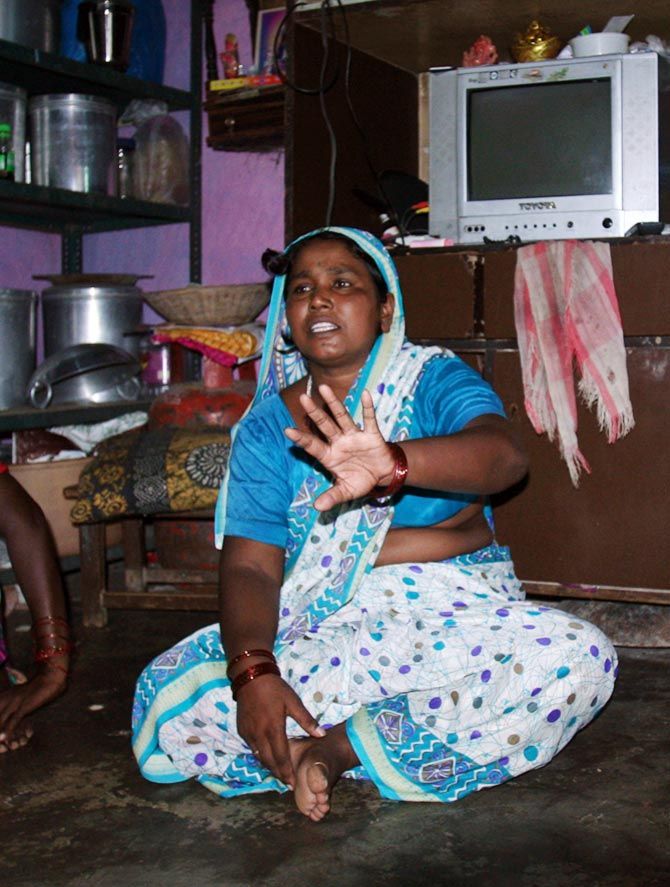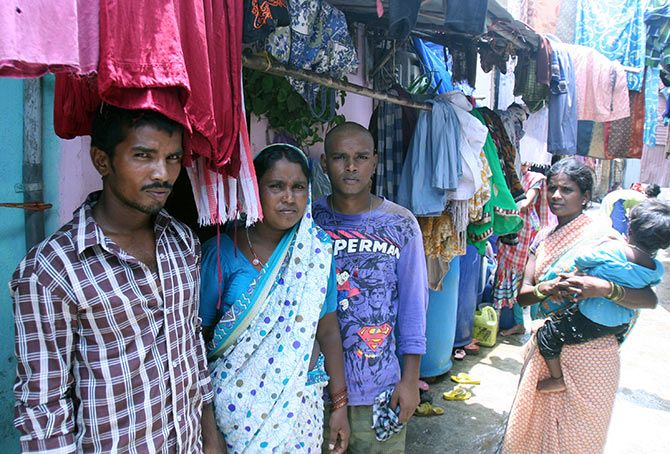Soon, she says, she will repay the Rs 50,000 she owes her debtors and start life afresh. "Without my husband."
Continuing our series on the Mumbai hooch tragedy, Rediff.com met with the Kamble family whose world came apart on June 18.
Text: Prasanna D Zore and Reuben NV; Photographs: Reuben NV
'Please keep quiet. Let me sleep. I beg of you. I am not a drunkard,' Sunil Rama Kamble would often tell his wife Sharda when he came home drunk.
On the morning of June 18, the Kambles were a family of six: Sons Balaji and Arun, and daughters Seema and Chhaya.
By that evening, the Kamble household was reduced to five.

Sunil Kamble passed away on his way to the Shatabdi Hospital, one of the 104 men who died after consuming spurious liquor that day.
As was his wont, Kamble, an autorickshaw driver, who earned Rs 200 on a bad day and as much as Rs 500 when the "Gods smiled upon us," says his wife, "would come home in the afternoon, give us his earnings and then take Rs 40 to Rs 50 to go out and drink."
After he woke up from a siesta he would freshen up, drink a cup of tea, and go back to plying his autorickshaw.
On June 18 too, after finishing his "morning shift," Kamble came home, gave his wife 200-odd rupees and went out for his "daily dose", which was sold near the autorickshaw stand he would park his vehicle at, even in broad daylight.
"When he came back by 2 pm, he said he had a headache and went to sleep," recalls Sharda. At around 4 pm, when Kamble woke up, he said he could not see anything. 'Dolyapudhe andhaar distoy (I can see only darkness),' he said. "He seemed very, very scared."
Later, when he gained partial vision, Kamble asked his wife for tea. After drinking the tea he complained that his chest was burning. So Sharda gave him lemon juice following which he went out to pass urine and smoke a bidi.
"When he came inside the house, he collapsed. His body had stiffened. There were fluids coming out of his mouth. He fell unconscious," Sharda says, remembering the sequence of events that fateful evening.
Since her elder son Balaji had moved to their village near Kolhapur for work, Sharda summoned her younger son Arun, who along with neighbours, decided to take Kamble to the Shatabdi Hospital around 6 pm.
"It was raining very heavily that evening. The lanes of this area are so small that it takes a long time to rush people to hospital during such emergencies," recalls Sharda about the difficulties she and her son encountered while taking Kamble to the hospital. "We reached Shatabdi around 7 pm because of the rain and the traffic. The doctor declared him 'brought dead'."
***

'Peeun kasa chalel? Aapan Mumbai madhe aahot; aaplyala char mula aahet (How will we manage our expenses if you keep drinking like this? Mumbai is an expensive city and we have four children to look after),' Sharda would often tell her husband when he came home drunk, to which Kamble would respond, 'Please keep quiet. Let me sleep. I am not a drunkard.'
Sharda keeps narrating this exchange, remembering her husband. When we met her outside her house she requested us to go to her neighbour's house and said she would soon join us. "Pahune aale aahet (We have guests at our house and it is crowded)," she said, pointing towards relatives who had traveled from the village in Kolhapur to mourn with the family.
Balaji, who missed his father's funeral because he was in Kolhapur working at a farm, is preparing to return to work. In his absence, the younger Arun performed the last rites.
The family needs somebody in the family, apart from Sharda who works as a maid, to earn money to make ends meet now. Balaji earns Rs 7,000 driving a tractor in the village.
Sharda owes Rs 50,000 to neighbours and her employers from whom she borrowed money to perform her husband's last rites as well as ceremonies "for his moksh (salvation)."
"Tyanchi aatma tadfadayla nako ugach. Mhanu evdha paisa otla (If we hadn't performed all the religious rites after his death he would not have received salvation. So we spent as much money as we could)," Sharda tells us.
She received the cheque for Rs 100,000 from the local revenue office which the Maharashtra government granted all victims's families.
Soon, she says, she will repay the Rs 50,000 she owes her debtors and start life afresh. "Without my husband."
EARLIER IN THE SERIES:











 © 2025
© 2025